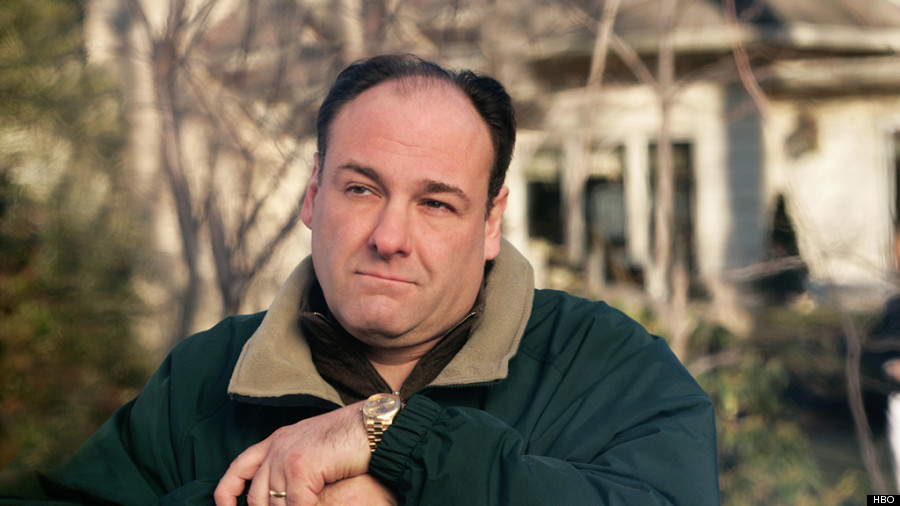
If you're anything like Bryan Cranston, psychopaths are your "catnip." Of course, you probably aren't an actor who portrayed one (or something similar to one) on a beloved television drama.
But James Fallon, who studies human behavior and wrote the 2013 book "The Psychopath Inside: A Neuroscientist's Personal Journey into the Dark Side of the Brain," says the same thing that lured Cranston to the Emmy-winning role of "Breaking Bad" antihero Walter White is what prompted five seasons' worth of fan obsession. Brain research now agrees we're all born with morality and that, within the first two years of our lives, our conscience is stretched, suppressed and bent in all sorts of ways. What we're left with, in terms of popular culture, are shows like "Breaking Bad" and the work of Terence Winter ("The Sopranos," "Boardwalk Empire," "The Wolf of Wall Street") -- projects that, as Fallon puts it, "stretch our sense of what a person is."
At a Tribeca Film Festival panel moderated by "Nightline" co-anchor Juju Chang on April 22, Cranston, Winter and Fallon discussed the topic of "Psychos We Love" before a packed auditorium at downtown Manhattan's School of Visual Arts. Here are a few takeaways from their conversation:
1. Terence Winter was rooting for Walter White.
Winter won multiple Emmys for his work on "The Sopranos," and last month his "Wolf of Wall Street" screenplay was nominated for an Oscar. In other words, he knows his way around criminalistic characters. While you were debating whether Walter White's fate was worthy of your sympathy, Winter was rooting for him. "In terms of any character, I think any human being in all of their full range of colors and emotions, you've got to find moments of relatability, empathy," Winter said. "Tony Soprano is a great example. You see him doing these horrific things, and then you realize he's having problems with his teenage kids. I've had people come up to me and say, 'It was like you were eavesdropping on a conversation with me and daughter,' and then they feel like they really understand this guy and then he goes and kills somebody and it draws you out of that."
2. Walter White is the antithesis to Archie Bunker.
"Breaking Bad" creator Vince Gilligan set out to craft a show about "change," according to Cranston. "In most cases, television is about stasis: reliable characters who adjusted to stimuli, but basically were the same however they were. And there's comfort in that," Cranston said. "Archie Bunker was fun to watch, and I appreciate his staunch, dogmatic grouchiness. But this is about the attempt to change: to go from a good character to a bad one."
3. To Winter, the best example of a good character embracing his inner evil is Michael Corleone shooting Sollozzo and McCluskey in "The Godfather."
"It was three shots fired in that scene, and it's one of the most intense scenes in cinema history," Winter said. "You really feel like you're sitting in the shoes of a guy who's about to kill somebody for the first time."
4. There's a reason antiheroes are so popular all of a sudden.
"In days gone by, there were those bad guys of poorly written material who were just bad. No reason, no rhyme -- they were just bad," Cranston said. "It's easy for the audience to cast them aside and just go, 'I'm not even afraid of him because he's just bad.' You know where he's coming from, you know what he wants. But a more interesting, complex character is someone who I'm not sure if he's good or bad. I'm uncertain. And that's what strikes the heart of Nucky [on 'Boardwalk Empire'] and Tony Soprano and my character."
5. HBO didn't seem to understand all of Winter and "Sopranos" creator David Chase's characterization.
"These characters lie to each other all the time," Winter said. "We would very early on sometimes get network notes that would say, 'Well, this doesn't make sense on page 12 because Tony completely says the opposite on page 18.' I'd say, 'Yeah, he's lying.' They'd say, 'Oh!' Because all they do is lie to each other."
6. Cranston says there's one "Breaking Bad" moment that especially grossed him out.
"Early on, there was a scene where I instructed my young protege to buy a particular kind of plastic container to dissolve a body, and he said, 'Why do we have to do that when we have a perfectly good bathtub upstairs?' But this particular chemical eats away at porcelain, so the whole ceiling came down with all the liquified body parts and we had to clean it up," Cranston said. "Even though it wasn't real, I found myself gagging."
7. Of course, there are some things that cross the line.
Asked if there's anything too unspeakable to be depicted in entertainment, Winter and Cranston agreed that cruelty toward animals and children is where things get murky. But even beyond such heinous acts, writers must tread lightly (as Walter White would say).
"I wrote this scene in 'The Sopranos' where Adriana got killed," Winter said. "She was murdered, and I didn't do this consciously, but when I wrote this scene, I wrote that she crawls off-camera and you hear a gunshot. And somebody said, 'But you've written some of the most horrifically violent things we've seen on that show. Why did you not show her getting killed?' And I said I didn't know. At the time, it felt like the artful choice. But I didn't want to see that. I didn't want to see her get killed, and I didn't know that at the time."
8. Cranston has an interesting take on the famous "Breaking Bad" scene where Walt lets Jane choke on her own vomit while sleeping off a heroin binge. 
"There was a lot of discussion about how that would go," Cranston said. "I had a lot of thought about that. I thought objectively about how I want to have that scene conveyed, and then I just let it go. So I first wanted to respond in a humane way to a person who's choking to death and stop it. That's the impulse, to help. And then he stops himself because he realizes that this is the same person who's blackmailing him and threatening to expose his whole enterprise and turn it upside down. But she's just a girl; she could be my daughter. And so, again, you have an impulse to do something. But I think she got Jessie on heroin and is going to kill that boy who I have an affinity for. ... His act of omission tells the story. ... For some reason, I'm looking at Krysten Ritter's face, and she did a superb job, but I superimposed, for some reason my mind went to this thing, looking at this young girl, and that thought of 'She could have been my daughter,' and my real daughter's face took her place."
9. One clear cue a character is a psychopath: the nickname.
Fallon says true psychopaths want credit for their work and therefore wouldn't accept an alter ego like Walter White's Heisenberg. An everyday person who begins to display psychopathic tendencies would split the difference by adopting an alias.
10. Males and females have different relationships to psychopathy.
"There's a genetic reason why there are so many more male psychopaths than female psychopaths," Fallon said. "It turns out -- you know when you said, 'My mother made me do it?' -- the main warrior gene gets passed on the X chromosome. So the sons who are XY can only get it from the mother, whereas the females can get both forms but it's usually difficult and one gets suppressed. In an XY male, the son has nothing to oppose, so if his mother has that, he's got it."
Listen to the full panel discussion below.

